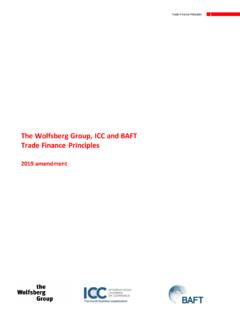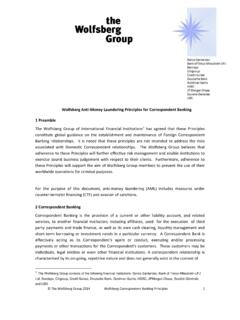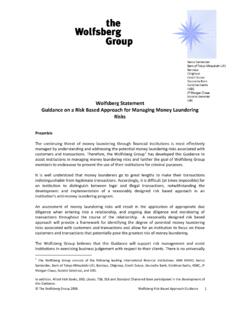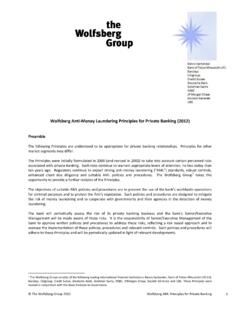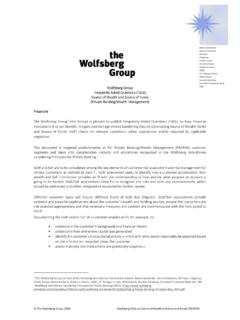Transcription of The Wolfsberg Group, ICC and BAFT Trade Finance …
1 PUBLIC 1 Trade Finance Principles The Wolfsberg Group, ICC and BAFT Trade Finance Principles PUBLIC 2 Trade Finance Principles Copyright 2017, Wolfsberg Group, International Chamber of Commerce (ICC) and BAFT Wolfsberg Group, ICC and BAFT hold all copyright and other intellectual property rights in this collective work, and encourage its reproduction and dissemination subject to the following: Wolfsberg Group, ICC and BAFT must be cited as the source and copyright holder mentioning the title of the document and the publication year if available.
2 Express written permission must be obtained for any modification, adaptation or translation, for any commercial use, and for use in any manner that implies that another organization or person is the source of, or is associated with, the work. The work may not be reproduced or made available on websites except through a link to the relevant Wolfsberg Group, ICC and/or BAFT web page (not to the document itself) Permission can be requested from the Wolfsberg Group, ICC or BAFT This document was prepared for general information purposes only, does not purport to be comprehensive, and is not intended as legal advice.
3 The opinions expressed are subject to change without notice, and any reliance upon information contained in the document is solely and exclusively at your own risk. The publishing organisations and the contributors are not engaged in rendering legal or other expert professional services for which outside competent professionals should be sought. PUBLIC 3 Trade Finance Principles Contents Foreword .. 4 Trade Finance Principles .. 6 1. Core .. 6 1. Introduction .. 6 2. Parties in Trade Transactions.
4 8 3. Financial Crime Risks .. 9 4. National and Regional Sanctions, Embargoes, and NPWMD .. 12 5. Challenges .. 14 6. Recommendations .. 15 2. Control Mechanisms .. 16 1. Introduction .. 16 2. Customer Due Diligence .. 16 3. Name Screening .. 17 4. Activity Based Financial Sanctions .. 17 5. Export Controls .. 18 6. Limitations .. 19 3. Escalation Procedures .. 20 1. Introduction .. 20 2. Three Lines of Defence .. 20 3. Application .. 21 4. Glossary .. 22 1. Terms .. 22 Appendix I: Documentary Credits.
5 29 Appendix II: Bills for Collection .. 43 Appendix III: Guarantees and Standby Letters of Credit .. 55 Appendix IV: Open Account .. 65 PUBLIC 4 Trade Finance Principles Foreword The Wolfsberg Group Trade Finance Principles paper and appendices were last updated in 2011. Since then regulatory expectations and a more stringent application of existing regulations have made it necessary to review the paper, identify where expectations have changed and, therefore, where the basic principles or their application need to be readdressed.
6 Since the last revision, the Wolfsberg Group has had an increasingly close dialogue with the ICC to see how the principles could be better disseminated to the ICC membership with a view to raising and standardising the practice level of Financial Crime Compliance (FCC) within the Trade Finance industry. To date, the only other publicly available guidance, which was specific to the United States, was the January 2008 BAFT IFSA Guidelines for Bank Secrecy Act/Anti-Money Laundering for Trade Services 1 and a subsequent March 2015 BAFT global update entitled Guidance for Identifying Potentially Suspicious Activity in Letters of Credit and Documentary Collections.
7 2 In discussion with many practitioners at ICC Banking Commission meetings and other industry events, it became clear that many banks saw the Wolfsberg Principles paper as being for large global banks and not for our smaller, local banks. There was also the view that if the ICC issued a guidance paper or official publication, then many more banks would see it as important to follow that guidance. This led to the formation of the joint ICC- Wolfsberg Group Trade Finance Principles Drafting Group in April 2014, with a remit to redraft and update the Wolfsberg Trade Finance Principles paper in the style of ICC guidance, with members drawn from Wolfsberg Group banks, ICC members globally, as well as BAFT so as to broaden the global perspective as part of the drafting group.
8 It is important to note that the core principles have not changed, nor have the responsibilities of the banks involved in Trade transactions to have a good knowledge of their customer or instructing party, the business that they conduct and with whom and where they are situated. Neither has the requirement for banks to follow strictly the regulations aimed at detecting and preventing Money Laundering, Financing of Terrorists or Terrorist Organisations, committing or assisting in Bribery and Corruption, evading tax liabilities, the proliferation of weapons of mass destruction and other financial crimes, or the evading or breaking of sanctions imposed on countries or individuals by competent authorities changed.
9 The core principles paper has been expanded to give more detail around what is meant by various risk mitigation activities, describes the challenges and limitations faced and also recommends actions that law enforcement, customs and other government agencies and policy makers still need to address to help the financial services industry meet its obligations under Financial Crimes Compliance frameworks. In order to strengthen the description of the control and escalation framework that banks need to have in place in order to meet the core principles paper s guidance, the former appendices V, VI and VII on Control, Escalation and the Glossary, have been incorporated as sections 2, 3 and 4 of the new Core paper, so that readers do not need to move between appendix and the Core paper to understand the guidance given in the product specific appendices.
10 It is strongly recommended that practitioners also refer to the other Wolfsberg Group papers in respect of Customer Due Diligence (CDD), Correspondent Banking, the use of SWIFT RMAs, and the Risk Based Approach (RBA) all of which reflect the requirements of regulators and the International Standards on Combating Money Laundering and the Financing of Terrorism and Proliferation, known as the FATF 40 Recommendations. These principles apply to all banks regardless of size and do not require a bank to have significant electronic systems to be in place to apply them.
